Columbia Southern University: Argument Paper on Employee Satisfaction
VerifiedAdded on 2022/08/22
|6
|1313
|12
Report
AI Summary
This argument paper examines the complex relationship between employee emotional satisfaction and organizational success. The paper begins with an introduction highlighting the significance of employee satisfaction in fostering a productive work environment and its impact on the overall growth of a business. It then explores the controversy surrounding the impact of emotional support and the time consumption that can affect productivity. The paper also provides a literature review, discussing the importance of emotional satisfaction in job performance and motivation. It presents two viewpoints: one supporting the focus on emotional needs and the other emphasizing potential time constraints and productivity concerns. The paper cites several studies and authors to support both sides of the argument, including the impact of emotional intelligence, team building, work pressure, and attrition rates. Finally, it concludes by summarizing the key arguments and emphasizing the need for a balanced approach to managing employee emotions within an organization. The paper concludes by highlighting the need for balance between acknowledging emotional needs and maintaining productivity.
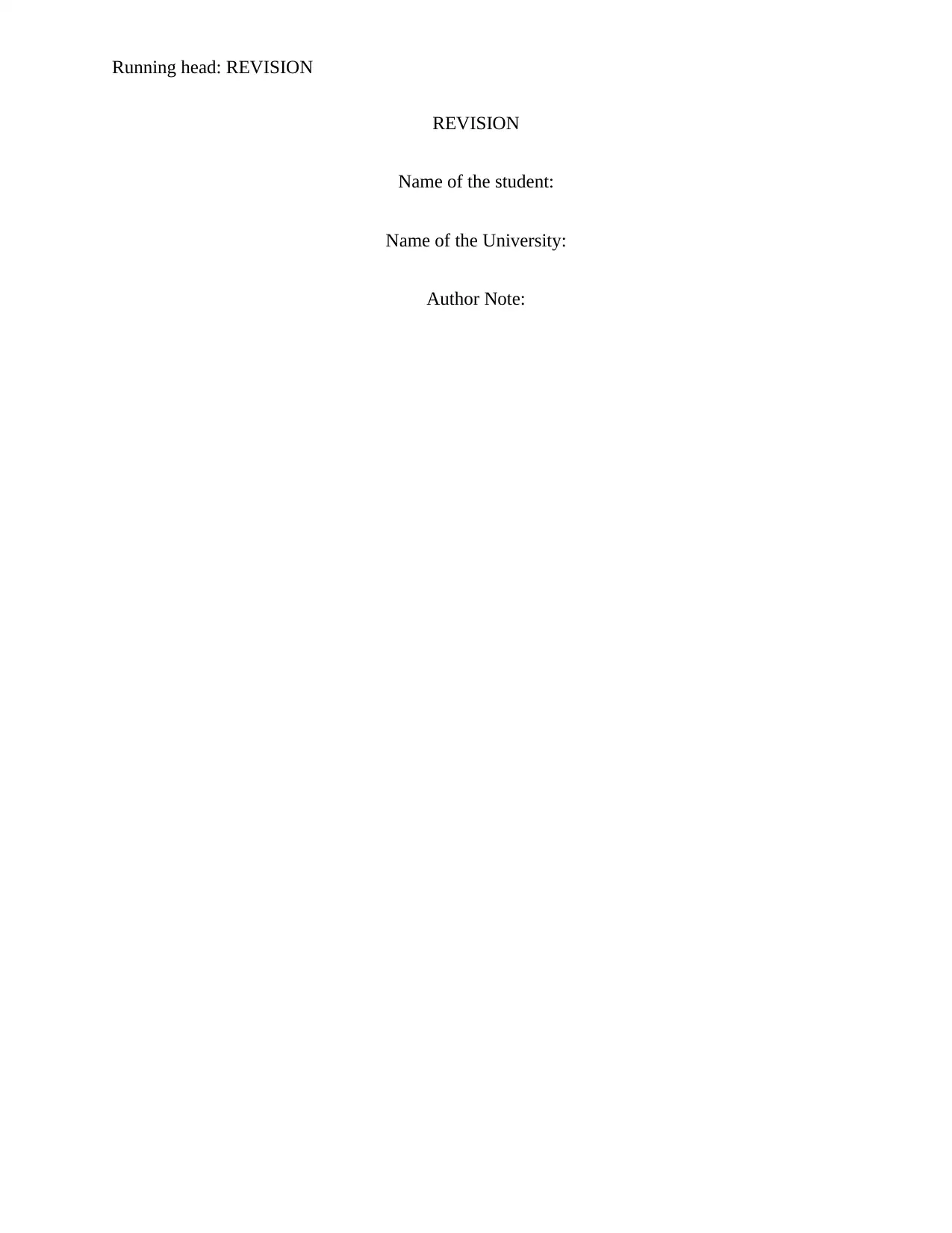
Running head: REVISION
REVISION
Name of the student:
Name of the University:
Author Note:
REVISION
Name of the student:
Name of the University:
Author Note:
Paraphrase This Document
Need a fresh take? Get an instant paraphrase of this document with our AI Paraphraser
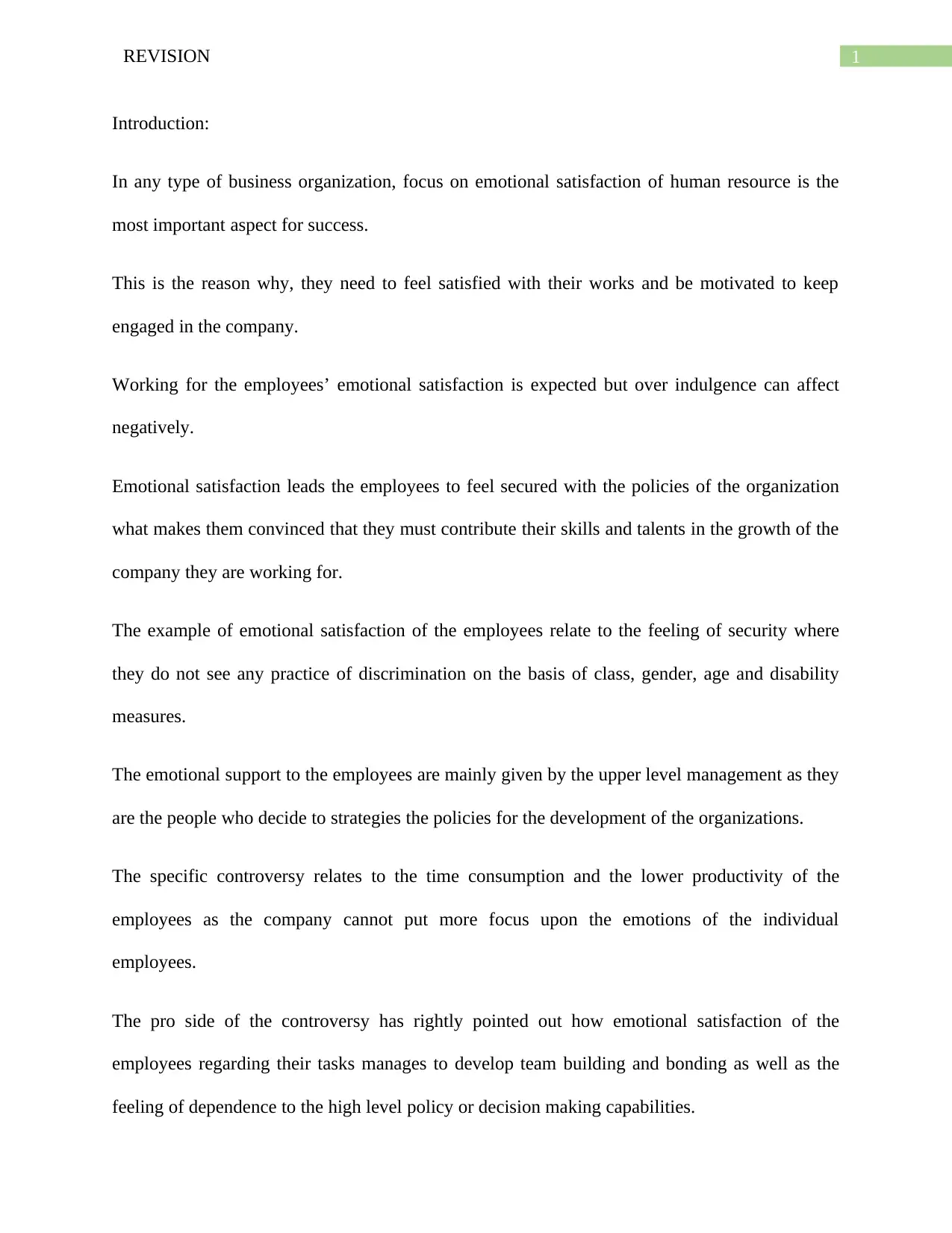
1REVISION
Introduction:
In any type of business organization, focus on emotional satisfaction of human resource is the
most important aspect for success.
This is the reason why, they need to feel satisfied with their works and be motivated to keep
engaged in the company.
Working for the employees’ emotional satisfaction is expected but over indulgence can affect
negatively.
Emotional satisfaction leads the employees to feel secured with the policies of the organization
what makes them convinced that they must contribute their skills and talents in the growth of the
company they are working for.
The example of emotional satisfaction of the employees relate to the feeling of security where
they do not see any practice of discrimination on the basis of class, gender, age and disability
measures.
The emotional support to the employees are mainly given by the upper level management as they
are the people who decide to strategies the policies for the development of the organizations.
The specific controversy relates to the time consumption and the lower productivity of the
employees as the company cannot put more focus upon the emotions of the individual
employees.
The pro side of the controversy has rightly pointed out how emotional satisfaction of the
employees regarding their tasks manages to develop team building and bonding as well as the
feeling of dependence to the high level policy or decision making capabilities.
Introduction:
In any type of business organization, focus on emotional satisfaction of human resource is the
most important aspect for success.
This is the reason why, they need to feel satisfied with their works and be motivated to keep
engaged in the company.
Working for the employees’ emotional satisfaction is expected but over indulgence can affect
negatively.
Emotional satisfaction leads the employees to feel secured with the policies of the organization
what makes them convinced that they must contribute their skills and talents in the growth of the
company they are working for.
The example of emotional satisfaction of the employees relate to the feeling of security where
they do not see any practice of discrimination on the basis of class, gender, age and disability
measures.
The emotional support to the employees are mainly given by the upper level management as they
are the people who decide to strategies the policies for the development of the organizations.
The specific controversy relates to the time consumption and the lower productivity of the
employees as the company cannot put more focus upon the emotions of the individual
employees.
The pro side of the controversy has rightly pointed out how emotional satisfaction of the
employees regarding their tasks manages to develop team building and bonding as well as the
feeling of dependence to the high level policy or decision making capabilities.
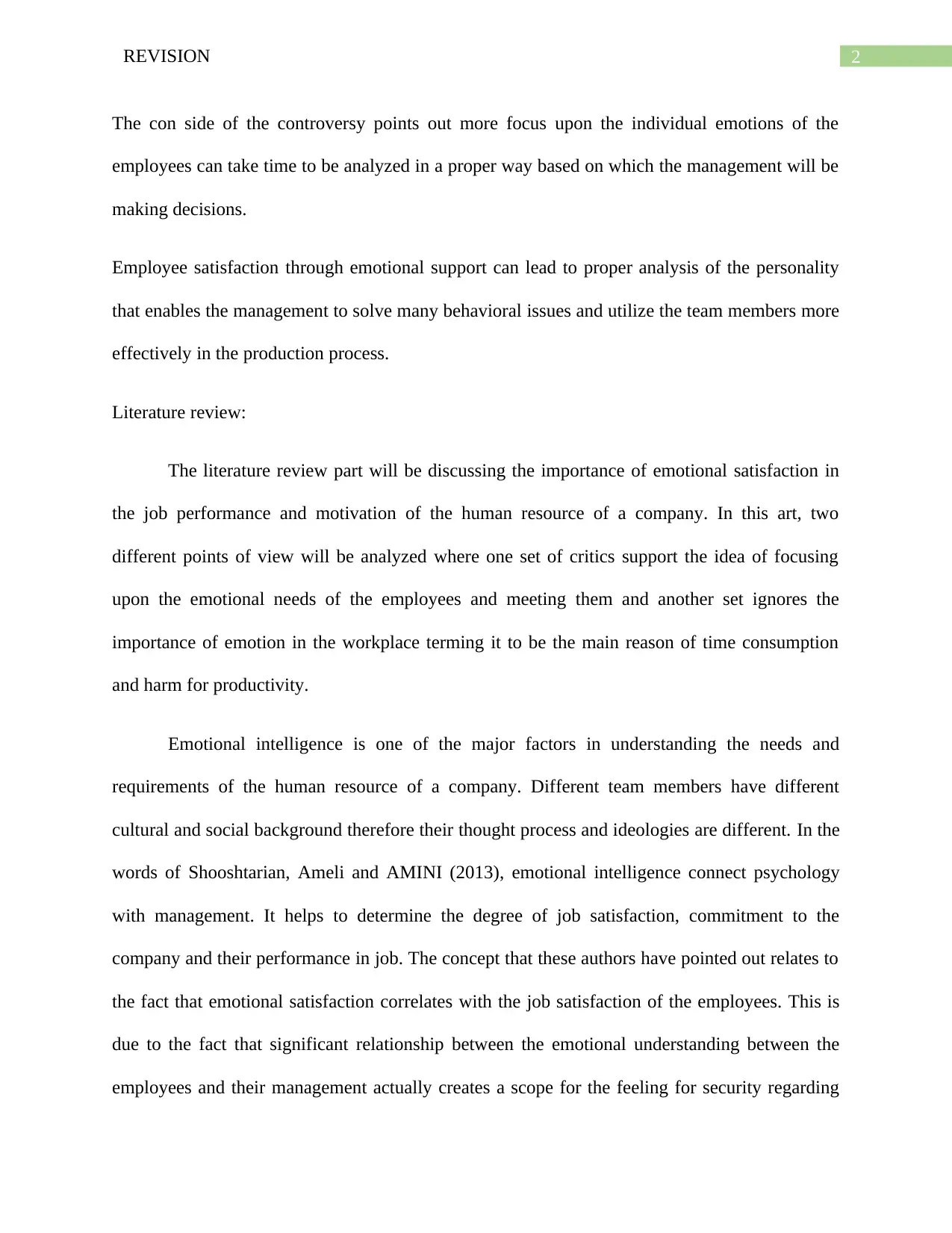
2REVISION
The con side of the controversy points out more focus upon the individual emotions of the
employees can take time to be analyzed in a proper way based on which the management will be
making decisions.
Employee satisfaction through emotional support can lead to proper analysis of the personality
that enables the management to solve many behavioral issues and utilize the team members more
effectively in the production process.
Literature review:
The literature review part will be discussing the importance of emotional satisfaction in
the job performance and motivation of the human resource of a company. In this art, two
different points of view will be analyzed where one set of critics support the idea of focusing
upon the emotional needs of the employees and meeting them and another set ignores the
importance of emotion in the workplace terming it to be the main reason of time consumption
and harm for productivity.
Emotional intelligence is one of the major factors in understanding the needs and
requirements of the human resource of a company. Different team members have different
cultural and social background therefore their thought process and ideologies are different. In the
words of Shooshtarian, Ameli and AMINI (2013), emotional intelligence connect psychology
with management. It helps to determine the degree of job satisfaction, commitment to the
company and their performance in job. The concept that these authors have pointed out relates to
the fact that emotional satisfaction correlates with the job satisfaction of the employees. This is
due to the fact that significant relationship between the emotional understanding between the
employees and their management actually creates a scope for the feeling for security regarding
The con side of the controversy points out more focus upon the individual emotions of the
employees can take time to be analyzed in a proper way based on which the management will be
making decisions.
Employee satisfaction through emotional support can lead to proper analysis of the personality
that enables the management to solve many behavioral issues and utilize the team members more
effectively in the production process.
Literature review:
The literature review part will be discussing the importance of emotional satisfaction in
the job performance and motivation of the human resource of a company. In this art, two
different points of view will be analyzed where one set of critics support the idea of focusing
upon the emotional needs of the employees and meeting them and another set ignores the
importance of emotion in the workplace terming it to be the main reason of time consumption
and harm for productivity.
Emotional intelligence is one of the major factors in understanding the needs and
requirements of the human resource of a company. Different team members have different
cultural and social background therefore their thought process and ideologies are different. In the
words of Shooshtarian, Ameli and AMINI (2013), emotional intelligence connect psychology
with management. It helps to determine the degree of job satisfaction, commitment to the
company and their performance in job. The concept that these authors have pointed out relates to
the fact that emotional satisfaction correlates with the job satisfaction of the employees. This is
due to the fact that significant relationship between the emotional understanding between the
employees and their management actually creates a scope for the feeling for security regarding
⊘ This is a preview!⊘
Do you want full access?
Subscribe today to unlock all pages.

Trusted by 1+ million students worldwide
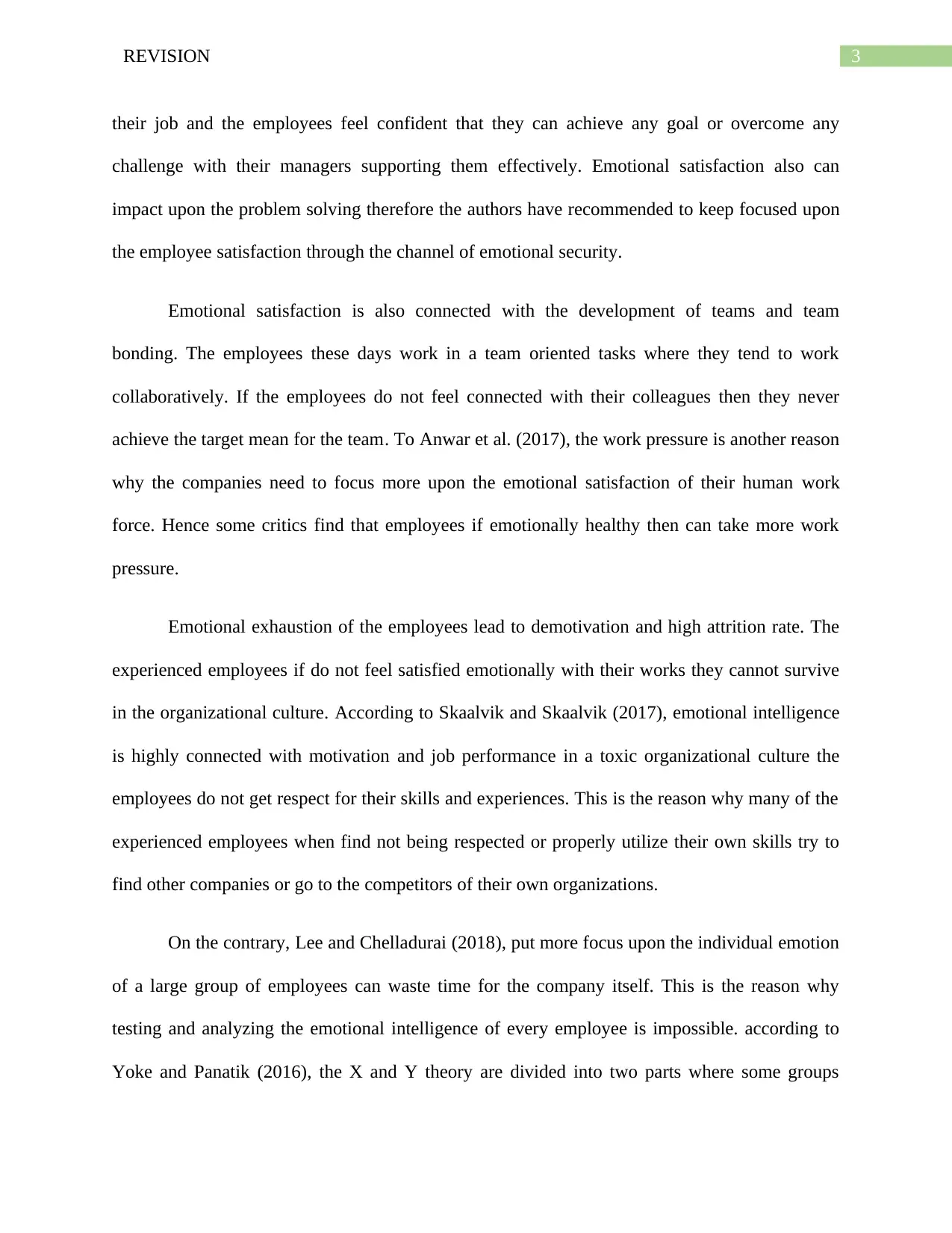
3REVISION
their job and the employees feel confident that they can achieve any goal or overcome any
challenge with their managers supporting them effectively. Emotional satisfaction also can
impact upon the problem solving therefore the authors have recommended to keep focused upon
the employee satisfaction through the channel of emotional security.
Emotional satisfaction is also connected with the development of teams and team
bonding. The employees these days work in a team oriented tasks where they tend to work
collaboratively. If the employees do not feel connected with their colleagues then they never
achieve the target mean for the team. To Anwar et al. (2017), the work pressure is another reason
why the companies need to focus more upon the emotional satisfaction of their human work
force. Hence some critics find that employees if emotionally healthy then can take more work
pressure.
Emotional exhaustion of the employees lead to demotivation and high attrition rate. The
experienced employees if do not feel satisfied emotionally with their works they cannot survive
in the organizational culture. According to Skaalvik and Skaalvik (2017), emotional intelligence
is highly connected with motivation and job performance in a toxic organizational culture the
employees do not get respect for their skills and experiences. This is the reason why many of the
experienced employees when find not being respected or properly utilize their own skills try to
find other companies or go to the competitors of their own organizations.
On the contrary, Lee and Chelladurai (2018), put more focus upon the individual emotion
of a large group of employees can waste time for the company itself. This is the reason why
testing and analyzing the emotional intelligence of every employee is impossible. according to
Yoke and Panatik (2016), the X and Y theory are divided into two parts where some groups
their job and the employees feel confident that they can achieve any goal or overcome any
challenge with their managers supporting them effectively. Emotional satisfaction also can
impact upon the problem solving therefore the authors have recommended to keep focused upon
the employee satisfaction through the channel of emotional security.
Emotional satisfaction is also connected with the development of teams and team
bonding. The employees these days work in a team oriented tasks where they tend to work
collaboratively. If the employees do not feel connected with their colleagues then they never
achieve the target mean for the team. To Anwar et al. (2017), the work pressure is another reason
why the companies need to focus more upon the emotional satisfaction of their human work
force. Hence some critics find that employees if emotionally healthy then can take more work
pressure.
Emotional exhaustion of the employees lead to demotivation and high attrition rate. The
experienced employees if do not feel satisfied emotionally with their works they cannot survive
in the organizational culture. According to Skaalvik and Skaalvik (2017), emotional intelligence
is highly connected with motivation and job performance in a toxic organizational culture the
employees do not get respect for their skills and experiences. This is the reason why many of the
experienced employees when find not being respected or properly utilize their own skills try to
find other companies or go to the competitors of their own organizations.
On the contrary, Lee and Chelladurai (2018), put more focus upon the individual emotion
of a large group of employees can waste time for the company itself. This is the reason why
testing and analyzing the emotional intelligence of every employee is impossible. according to
Yoke and Panatik (2016), the X and Y theory are divided into two parts where some groups
Paraphrase This Document
Need a fresh take? Get an instant paraphrase of this document with our AI Paraphraser
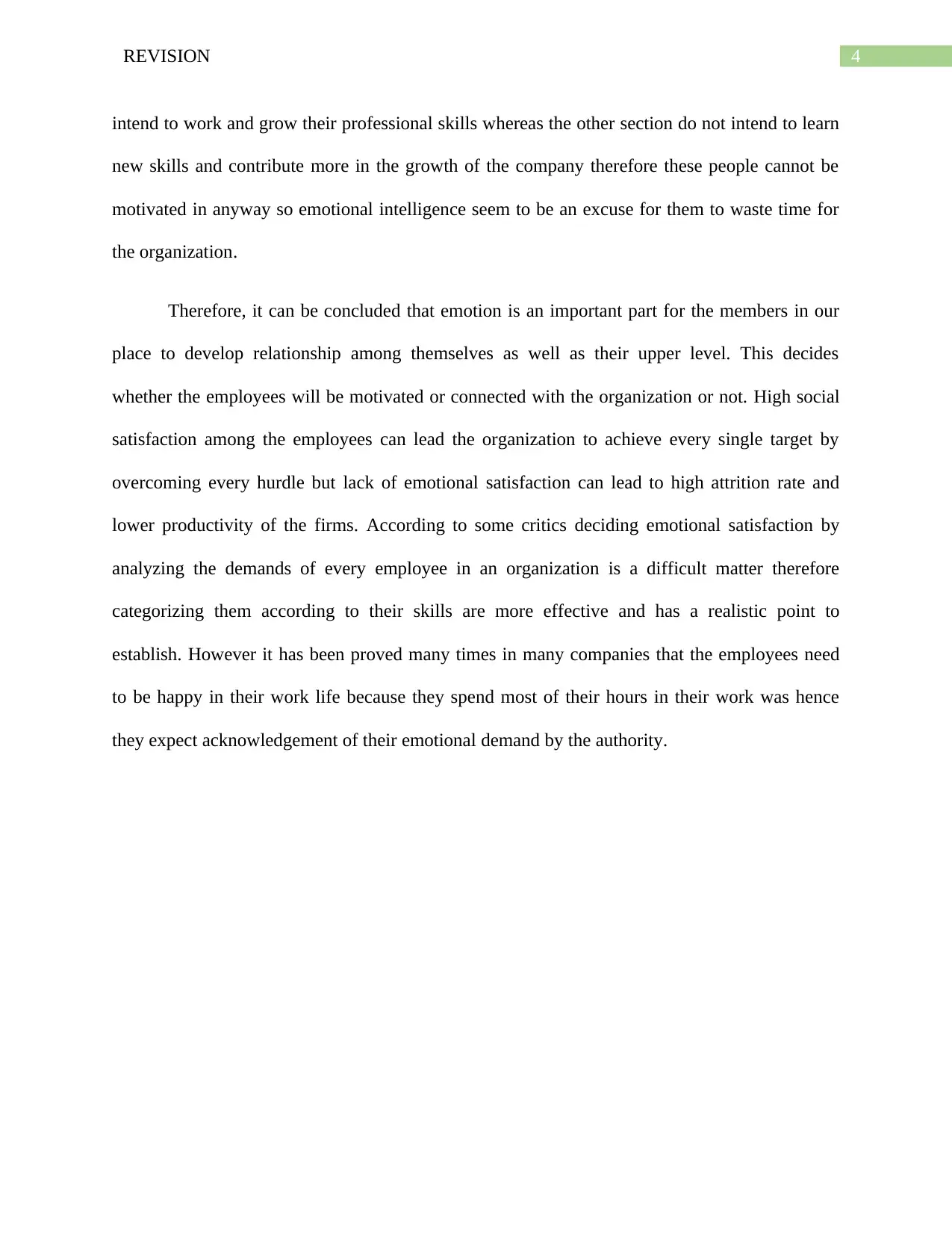
4REVISION
intend to work and grow their professional skills whereas the other section do not intend to learn
new skills and contribute more in the growth of the company therefore these people cannot be
motivated in anyway so emotional intelligence seem to be an excuse for them to waste time for
the organization.
Therefore, it can be concluded that emotion is an important part for the members in our
place to develop relationship among themselves as well as their upper level. This decides
whether the employees will be motivated or connected with the organization or not. High social
satisfaction among the employees can lead the organization to achieve every single target by
overcoming every hurdle but lack of emotional satisfaction can lead to high attrition rate and
lower productivity of the firms. According to some critics deciding emotional satisfaction by
analyzing the demands of every employee in an organization is a difficult matter therefore
categorizing them according to their skills are more effective and has a realistic point to
establish. However it has been proved many times in many companies that the employees need
to be happy in their work life because they spend most of their hours in their work was hence
they expect acknowledgement of their emotional demand by the authority.
intend to work and grow their professional skills whereas the other section do not intend to learn
new skills and contribute more in the growth of the company therefore these people cannot be
motivated in anyway so emotional intelligence seem to be an excuse for them to waste time for
the organization.
Therefore, it can be concluded that emotion is an important part for the members in our
place to develop relationship among themselves as well as their upper level. This decides
whether the employees will be motivated or connected with the organization or not. High social
satisfaction among the employees can lead the organization to achieve every single target by
overcoming every hurdle but lack of emotional satisfaction can lead to high attrition rate and
lower productivity of the firms. According to some critics deciding emotional satisfaction by
analyzing the demands of every employee in an organization is a difficult matter therefore
categorizing them according to their skills are more effective and has a realistic point to
establish. However it has been proved many times in many companies that the employees need
to be happy in their work life because they spend most of their hours in their work was hence
they expect acknowledgement of their emotional demand by the authority.
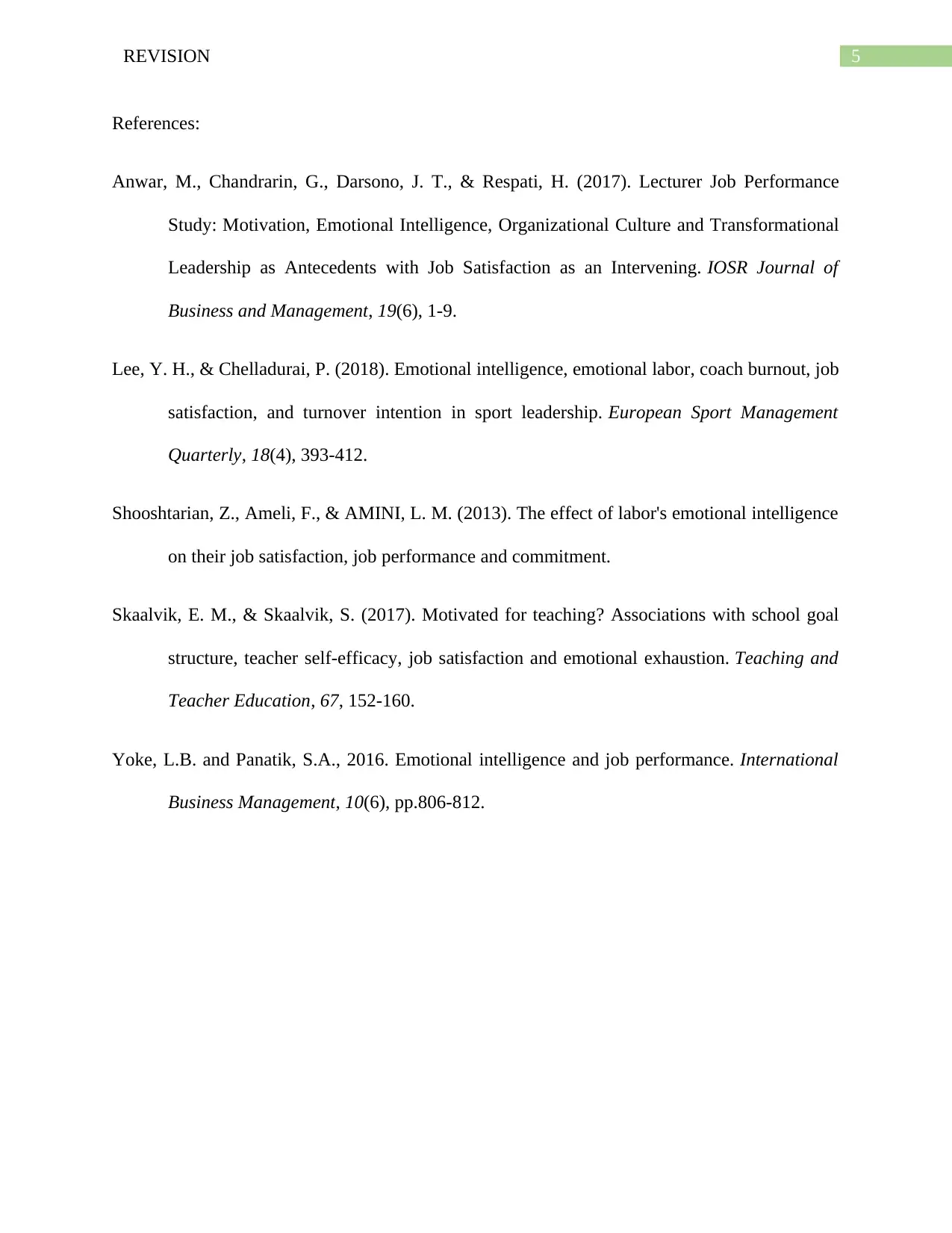
5REVISION
References:
Anwar, M., Chandrarin, G., Darsono, J. T., & Respati, H. (2017). Lecturer Job Performance
Study: Motivation, Emotional Intelligence, Organizational Culture and Transformational
Leadership as Antecedents with Job Satisfaction as an Intervening. IOSR Journal of
Business and Management, 19(6), 1-9.
Lee, Y. H., & Chelladurai, P. (2018). Emotional intelligence, emotional labor, coach burnout, job
satisfaction, and turnover intention in sport leadership. European Sport Management
Quarterly, 18(4), 393-412.
Shooshtarian, Z., Ameli, F., & AMINI, L. M. (2013). The effect of labor's emotional intelligence
on their job satisfaction, job performance and commitment.
Skaalvik, E. M., & Skaalvik, S. (2017). Motivated for teaching? Associations with school goal
structure, teacher self-efficacy, job satisfaction and emotional exhaustion. Teaching and
Teacher Education, 67, 152-160.
Yoke, L.B. and Panatik, S.A., 2016. Emotional intelligence and job performance. International
Business Management, 10(6), pp.806-812.
References:
Anwar, M., Chandrarin, G., Darsono, J. T., & Respati, H. (2017). Lecturer Job Performance
Study: Motivation, Emotional Intelligence, Organizational Culture and Transformational
Leadership as Antecedents with Job Satisfaction as an Intervening. IOSR Journal of
Business and Management, 19(6), 1-9.
Lee, Y. H., & Chelladurai, P. (2018). Emotional intelligence, emotional labor, coach burnout, job
satisfaction, and turnover intention in sport leadership. European Sport Management
Quarterly, 18(4), 393-412.
Shooshtarian, Z., Ameli, F., & AMINI, L. M. (2013). The effect of labor's emotional intelligence
on their job satisfaction, job performance and commitment.
Skaalvik, E. M., & Skaalvik, S. (2017). Motivated for teaching? Associations with school goal
structure, teacher self-efficacy, job satisfaction and emotional exhaustion. Teaching and
Teacher Education, 67, 152-160.
Yoke, L.B. and Panatik, S.A., 2016. Emotional intelligence and job performance. International
Business Management, 10(6), pp.806-812.
⊘ This is a preview!⊘
Do you want full access?
Subscribe today to unlock all pages.

Trusted by 1+ million students worldwide
1 out of 6
Related Documents
Your All-in-One AI-Powered Toolkit for Academic Success.
+13062052269
info@desklib.com
Available 24*7 on WhatsApp / Email
![[object Object]](/_next/static/media/star-bottom.7253800d.svg)
Unlock your academic potential
Copyright © 2020–2026 A2Z Services. All Rights Reserved. Developed and managed by ZUCOL.




